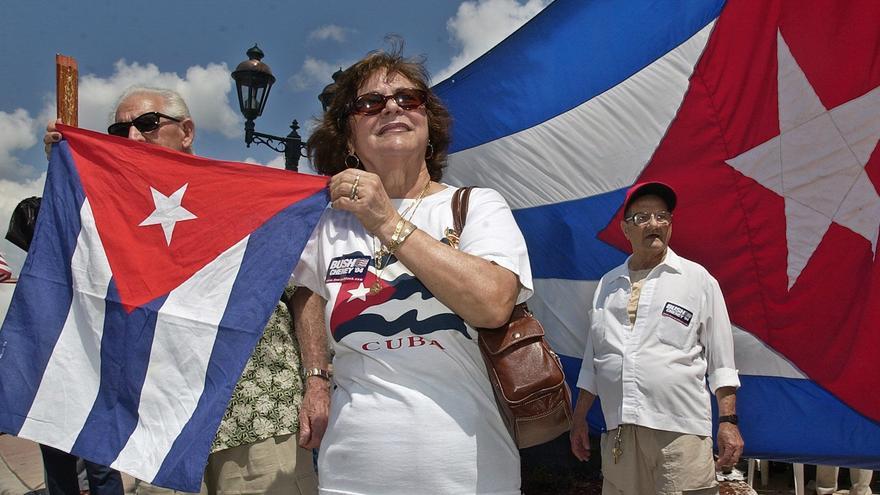
![]() 14ymedio, Havana, 11 December 2019 — The Cuban authorities have called on the emigrants who “respect, love Cuba, defend it freely and independently and actively oppose the US blockade” to the 4th Nation and Immigration Conference, which will be held in Havana between April 8th and 10th. The announcement comes in advance, four months before the meeting, and coincides with the campaign promoted by the exile to temporarily cut off remittances to the Island to harm the Government.
14ymedio, Havana, 11 December 2019 — The Cuban authorities have called on the emigrants who “respect, love Cuba, defend it freely and independently and actively oppose the US blockade” to the 4th Nation and Immigration Conference, which will be held in Havana between April 8th and 10th. The announcement comes in advance, four months before the meeting, and coincides with the campaign promoted by the exile to temporarily cut off remittances to the Island to harm the Government.
The Cuban chancellor, Bruno Rodríguez, spread the call on Twitter shortly after President Miguel Díaz-Canel expressed it in a meeting with Cubans in Argentina, where he in on an official visit to attend the inauguration of Alberto Fernández as new head of state. “We give continuity to the policy initiated by our leader Fidel Castro with the Dialogue of 78,” Cuba’s head of Foreign Relations added on Twitter.
For Rodríguez, the holding of the conference “shows that strengthening ties with our nationals abroad is a continuous and irreversible process.”
Ernesto Soberón Guzmán, general director of the Office of Consular Affairs and Assistance to Cuban Residents Abroad, expanded on the information. “Many of the Cubans residing outside the country are associated with 166 organizations in 79 nations, from where they defend the sovereignty of their homeland and speak out against the blockade,” said the official, making it clear who could participate.
On social networks, many exiles reacted by criticizing the use that the authorities make of emigrants, whose money transfers essentially nourish the coffers of the State.
The independent journalist Boris González attributed the announcement precisely to the boycott promoted against remittances. “Díaz-Canel announces in a surprising way, in Argentina, the Fourth Conference on the Nation and Emigration, a corpse that Castro encourages every time he’s in water up to his neck. On the eve of the boycott convened in Miami, Castro dons his flexible mask,” he wrote on his Facebook profile.
According to a report published at the end of September by The Havana Consulting Group, in 2018 alone the Island received 6.6 billion dollars from Cubans abroad, both in cash and in merchandise, four times that received from foreign investments on which the authorities bet so much. Of the remittances, 90% come from the USA.
Some users have also criticized the fact that Cubans continue to be forced to maintain their nationality and, thus, their passport, whose price is very high [Cubans born in Cuba are not permitted to travel to Cuba on the passport of another country]. The Cuban passport is among the most expensive in the world, costing around 450 dollars. Its duration is six years, and it has to be extended twice, which means a cost of almost 500 dollars.
Díaz-Canel said recently, speaking to Cuban exiles in Ireland, that he is “aware of a group of concerns about the price of the passport” and indicated that the government is analyzing, assessing and seeking responses.
Another of the fundamental criticisms made to the announcement of the call was the refusal to let the exiles vote in last year’s constitutional referendum.
“In 2018, the participation of Cubans living abroad on the debate on the draft of the Constitution was realized. Everyone was able to contribute to the elaboration of our new Magna Carta, 40% of the approaches were accepted,” the Presidency announced on Twitter.
“And where was the right to vote of Cubans residing abroad or is it that they only want us to keep them in power economically?” one of the users reproached.
The first conference with exile took place in 1994, during the Special Period. In it, Fidel Castro had already conditioned the presence of Cubans residing abroad on “giving up personal political aspirations or group interests.” On that occasion the objective was, presumably, to attract those remittances that have ended up as the second leading source of income to the Cuban economy.
Since then, three more conferences have been held, all aimed, as expected, at requesting support from exiles for government policies.
_____________
COLLABORATE WITH OUR WORK: The 14ymedio team is committed to practicing serious journalism that reflects Cuba’s reality in all its depth. Thank you for joining us on this long journey. We invite you to continue supporting us by becoming a member of 14ymedio now. Together we can continue transforming journalism in Cuba.
